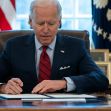Over the past year, the unemployment rate has steadily dropped, with April 2021 showing the first tick up at 6.1% compared to March’s 6% unemployment rate. The latest figures are nearly half of what they were this time last year, leaving many economists speculating how far-reaching the effects of the pandemic will be.
As the vaccine rollout continues in full force and industries that were hit hardest during the pandemic are starting to pick back up, the nation’s efforts of pushing back into normal are visible as restaurant and hospitality industries across the country continue to look for employees to fill available positions.
While many employers argue that the jobs are there, many Republican lawmakers are arguing that the additional federal unemployment relief provided by the Biden administration under the Unemployment Assistance Program (UAP) is serving as an incentive for those who are unemployed to stay home.
States Ending Federal Unemployment Benefits
In an effort to get workers back into the workforce, Florida announced this week that the state would be ending its extra $300 weekly payout for those claiming unemployment benefits. The federal unemployment aid which is set to expire in September will now end on June 26 according to Republican governor Ron DeSantis. Other unemployment benefits programs geared toward freelancers, the self-employed, and independent contractors will remain in place.
Dana Eagle of the Florida Department of Economic Opportunity shared in a statement, "Transitioning away from this (FPUC) benefit will help meet the demands of small and large businesses who are ready to hire and expand their workforce."
This move by Florida marks the latest Republican-led state that has announced its early severance of the unemployment program that’s helped support over two million Americans with unemployment aid. Currently, 23 states have announced they will stop the additional unemployment payments of $300 a week.
Montana’s governor Greg Gianforte also shared his sentiment that the unemployment benefits are the reason job vacancies are being left unfilled. After announcing plans to terminate the additional unemployment aid program in his state, he shared that "the vast expansion of federal unemployment benefits is now doing more harm than good." Gianforte also made mention of incentives needing to be put into place in order to draw workers back in.
Talks of increasing the minimum wage have also had economists speculating whether or not this could be the reason for the slow growth of unemployment. As the push toward a $15 minimum wage continues throughout the nation, there is speculation as to whether or not this is what is driving workers away from low-wage jobs that pay the current hourly minimum wage of $7.25. This push has been highly supported by a majority of Democratic legislators with Biden taking steps to increase the minimum wage to $15 an hour in certain sectors.
As the number of states opting out of the federal Pandemic Unemployment Assistance Program continues to grow, Democratic lawmakers have pushed back, urging the importance of the weekly benefits and their need to remain in place.
In a letter to the Secretary of Labor Mary Walsh, Vermont’s Democratic Senator Bernie Sanders explained that it is important that “workers receive these benefits even when states threaten to take it away.” Sanders added, “I urge you to commit to holding states accountable for their role in administering PUA benefits.” Sanders shared the sentiments of many Democratic lawmakers who fear the negative outcome if those who are unable to access necessary funds are left unsupported. Sanders explained that these families would be “forced into poverty—either with poor jobs with unfair wages or no income at all” if the benefits were not available.
In a crackdown against individuals who were taking advantage of the benefits program, President Biden shared in his address on the economy, “We're going to make it clear that anyone collecting unemployment who is offered a suitable job must take the job or lose their unemployment benefits. There are a few COVID-19-related exceptions so that people aren't forced to choose between their basic safety and a paycheck, but, otherwise, that's the law.”






